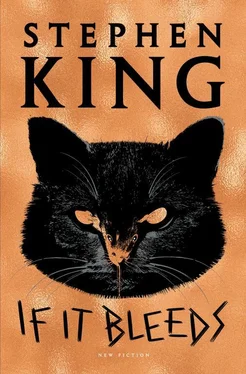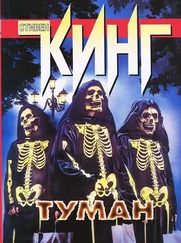Drew let out a breath he hadn’t known he was holding (a hoary suspense novel cliché that turned out to be true) and started for the porch. The hand holding the keys was shaking slightly. He was already telling himself that he hadn’t been in any danger, not really; if you didn’t bother a moose—even a protective Moose Mom—it wouldn’t bother you.
Besides, it could have been worse. It could have been a bear.
8
He let himself in, expecting a mess, but the cabin was spick and span. Old Bill’s work, surely; it was even possible Bill had given it one last putting-to-rights on the day he killed himself. Aggie Larson’s old rag rug still lay in the center of the room, threadbare around the edges but otherwise whole. There was a Ranger woodstove up on bricks and waiting to be loaded, its isinglass window as clean as the floor. To the left was a rudimentary kitchen. To the right, overlooking the woods sloping down to the brook, was an oak dining table. At the far end of the room were a swaybacked sofa, a couple of chairs, and a fireplace Drew felt dubious about lighting. God knew how much creosote might have collected in the chimney, not to mention wildlife: mice, squirrels, bats.
The cookstove was a Hotpoint that had probably been new back in the days when the only satellite circling the earth was the moon. Next to it, standing open and somehow corpselike, was an unplugged refrigerator. It was empty except for a box of Arm & Hammer baking soda. The television in the living room area was a portable on a rolling cart. He remembered the four of them sitting in front of it, watching M*A*S*H reruns and eating TV dinners.
Plank stairs ran up the west wall of the cabin. There was a kind of gallery up there, lined with bookcases that mostly held paperbacks—what Lucy had called rainy-day camp reading. Two small bedrooms opened off the gallery. Drew and Lucy had slept in one, the kids in the other. Did they stop coming here when Stacey began to bitch about needing her privacy? Was that why? Or did they just get too busy for summer weeks at camp? Drew couldn’t remember. He was just glad to be here, and glad none of their renters had made off with his mom’s rag rug… although why would they? It had once been pretty damn gorgeous, but was now fit only to be walked over by people in woods-muddy shoes or bare feet wet from wading in the brook.
“I can work here,” Drew said. “Yeah.” He jumped at the sound of his own voice—still nerved up from his stare-down with Moose Mom, he supposed—and then laughed.
He didn’t need to check the electricity, because he could see the red lamp flashing on Pop’s old answering machine, but he flipped the switch for the overhead lights anyway, because the afternoon was starting to thin out. He went over to the answering machine and hit PLAY.
“It’s Lucy, Drew.” She sounded wavery, as if her voice were coming from twenty thousand leagues under the sea, and Drew remembered this old answering gadget was basically a cassette deck. It was sort of amazing that it worked at all. “It’s ten past three, and I’m a little worried. Are you there yet? Call me as soon as you can.”
Drew was amused but also annoyed. He had come up here to avoid distractions, and the last thing he needed was Lucy looking over his shoulder for the next three weeks. Still, he supposed she had valid reasons to be concerned. He could have had an accident on the way up, or broken down on the Shithouse Road. She certainly couldn’t be worried that he was going mental over a book he hadn’t even started to write.
Thinking that brought back a memory of a lecture the English Department had sponsored five or six years before, Jonathan Franzen speaking to a full house on the art and craft of the novel. He had said that the peak of the novel-writing experience actually came before the writer began, while everything was still in his or her imagination. “Even the clearest part of what was in your mind gets lost in translation,” Franzen had said. Drew remembered thinking that it was rather self-centered of the guy to assume that his experience was the general case.
Drew picked up the phone (the receiver was the old dumbbell shape, basic black and amazingly heavy), heard a good strong dial tone, and called Lucy’s cell. “I’m here,” he said. “No problems.”
“Oh, good. How’s the road? How’s the cabin?”
They talked for awhile, then he talked to Stacey, who had just come in from school and demanded the phone. Lucy came back and reminded him to change the answering machine message because it was giving her the creeps.
“All I can promise is to try. This gadget was probably state-of-the-art in the seventies, but that was half a century ago.”
“Do your best. Have you seen any wildlife?”
He thought of Moose Mom, her head lowered as she decided whether or not to charge and trample him to death.
“A few crows, that’s about it. Hey, Luce, I want to haul my crap in before the sun goes down. I’ll call later.”
“Around seven-thirty would be good. You can talk to Brandon, he’ll be back by then. He’s eating dinner at Randy’s house.”
“Roger that.”
“Anything else to report?” There might have been worry in her voice, or that might only have been his imagination.
“Nope. All quiet on the Western Front. Love you, hon.”
“Love you, too.”
He placed the funny old-fashioned receiver back in its cradle and spoke to the empty cabin. “Oh wait, one other thing, honeybunch. Old Bill blew his head off right out front.”
And shocked himself by laughing.
9
By the time he had his luggage and supplies in, it was past six o’clock and he was hungry. He tried the kitchen faucet, and after a few chugs and thumps in the pipes, began to get splurts of cloudy water that eventually ran cold, clear, and steady. He filled a pot, turned on the Hotpoint (the low hum of the big burner brought back memories of other meals here), and waited for the water to boil so he could add spaghetti. There was sauce, too. Lucy had thrown a bottle of Ragu into one of his boxes of supplies. He would have forgotten.
He considered heating up a can of peas, and decided not to. He was at camp and would eat camp style. No alcohol, though; he had brought none with him and hadn’t bought any at the Big 90. If the work went well, as he expected, he might reward himself with a rack of Bud the next time he went down to the store. He might even find some salad stuff, although he had an idea that when it came to stocking vegetables, Roy DeWitt kept plenty of popcorn and hotdog relish on hand, and called it good. Maybe the odd bottle of sauerkraut for those with exotic tastes.
While he waited for the water to boil and the sauce to simmer, Drew turned on the TV, expecting nothing but snow. What he got instead was a bluescreen and a message that read DIRECTV CONNECTING. Drew had his doubts about that but left the TV alone to do its thing. Assuming it was doing anything.
He was rooting through one of the lower cabinets when Lester Holt’s voice blared into the cabin, startling him so badly that he gave a yell and dropped the colander he’d just found. When he turned around, he saw NBC’s nightly newscast, clear as a bell. Lester was reporting on the latest Trump farrago, and as he turned the story over to Chuck Todd for the dirty details, Drew grabbed the remote and killed the set. It was nice to know it worked, but he had no intention of junking up his mind with Trump, terrorism, or taxes.
He cooked a whole box of spaghetti and ate most of it. In his mind, Lucy waved a tut-tutting finger and mentioned—again—his growing middle-aged spread. Drew reminded her he had skipped lunch. He washed his few dishes, thinking about Moose Mom and suicide. Was there a place for either of them in Bitter River ? Moose Mom, probably not. Suicide, maybe.
Читать дальше








